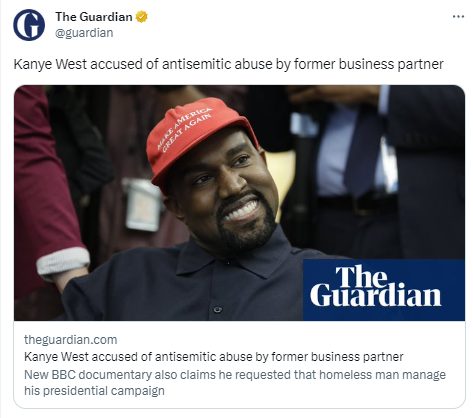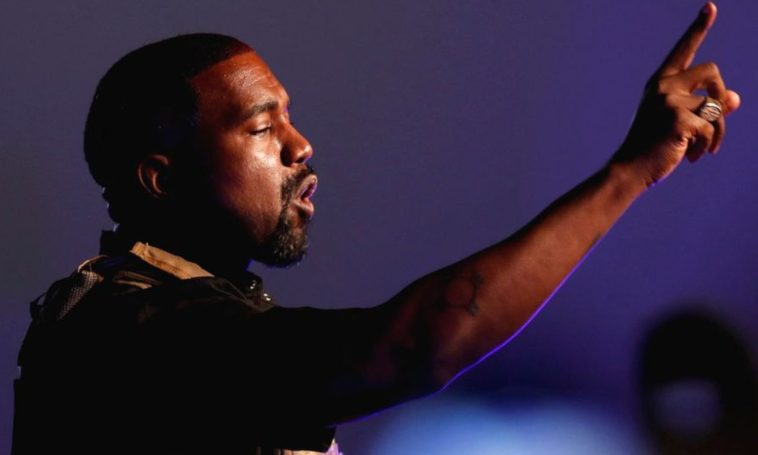“Never meet your heroes,” they say, but what happens when you film a documentary about them?
As Mobeen Azhar discovered, it’s… difficult.
Mobeen has been a tremendous admirer of Kanye West – now known as Ye – since his first album, The College Dropout, which he purchased on the day it was released in 2004.
He was captivated by Kanye’s “audacious” outsider attitude and his frequent, headline-grabbing outbursts, as were many other followers.

Kanye West is an artist who was not scared to “say things that many other people wouldn’t say.”
You don’t have to be a Kanye fan to notice that a lot has changed since then.
In less than a year, the rapper’s antisemitic rants contributed significantly to his loss of billionaire status and a slew of lucrative business partnerships.
This page contains descriptions of racism as well as other harsh and discriminatory terminology.
“I don’t believe we should dismiss him.”
Fans, especially Mobeen, were left wondering what was going on and looking for answers.
And it was when he was seeking them for his BBC Two documentary The Trouble with Kanye that he learned of new allegations of Kanye inflicting antisemitic abuse on someone.
Alex Klein, a former friend and business partner, claims the rapper told him “You’re exactly like the other Jews” when they parted ways after he assisted him with the publication of the Donda 2 album.
“I asked, ‘Do you really believe Jews are conspiring to hold you back?'” “And he said, ‘Yes, yes I do,'” Alex says to Mobeen.
According to the internet entrepreneur, Kanye defined his remarks regarding Jews as “not even a statement that I need to take back because look at all the energy around me right now.” I would not have been elected president if that comment had not been made.”

Mobeen met with music producer Malik Yusef, who has collaborated with Kanye on scores of tunes.
Mobeen stated that he was more interested in “exploring how he got to the point that he got to.”
“Like many others, I’ve watched his politics and views shift in recent years.” And I’ve been upset, outraged, and perplexed by a lot of what he’s put out there.”
So he assembled a film team, flew to Los Angeles, and went about discovering how it all began – and continues – for Kanye.
His initial move was to learn about his rise by “speaking to people who were in the room when a lot of the records that I know and have loved for a long time were made.”
Malik Yusef, a long-time Kanye producer who has worked on scores of the rapper’s tunes, was among them.
The rapper’s original objective, he said Mobeen, was to “wake people up to the true plight of African people in this day and age.”
But now, Malik says Kanye has “thrown himself on the pyre of white nationalism” – the concept that white people are superior to people of all other races and ethnicities.
It’s a bold claim, but one that Mobeen found some support for at a church on the outskirts of Los Angeles.

According to Mobeen, the Cornerstone Church is now the home of the “Kanye West Empire” and the headquarters for his 2024 presidential campaign.
According to Mobeen’s documentary, the rapper’s current collaborators are a far cry from those he worked with when he was ascending the hip-hop ladder.
People like Nick Fuentes, a well-known streamer who is generally labeled as a white nationalist with anti-Semitic beliefs, who is claimed to attend regular church sessions.
“He denies the Holocaust.” He does not support LGBT rights. And he is one of the key figures in the 2024 presidential race,” adds Mobeen.
Mobeen believes this is especially tough for him because Kanye “continues to wield enormous power” and “his words really, really matter.”
“I believe you’ll see that influence, as well as a lot of the philosophy that these people share, coming through in Ye’s statements and words.”
“And that surprised me.” It was startling to me.”
Mobeen says he’ll “keep listening to a lot of Kanye records.”
“However, in terms of Ye’s persona, that is something I’ve checked out of,” he explains.
“I don’t believe we should dismiss him. Because I believe it is critical to have these talks.
“I believe that is how society progresses.” But I believe we should criticize their viewpoints. I believe we must because they are beyond the pale.”







GIPHY App Key not set. Please check settings